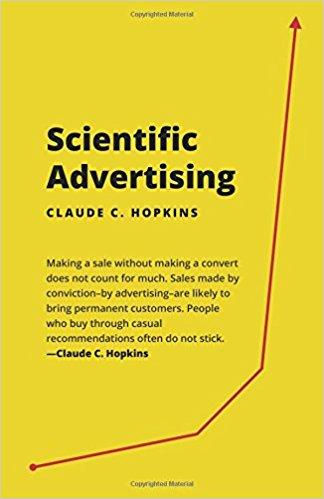Scientific Advertising Summary
7 min read ⌚
 Advertising isn’t an art.
Advertising isn’t an art.
It’s science.
And Claude C. Hopkins set the foundations of “Scientific Advertising“ a century ago.
Ignore him at your peril.
Who Should Read “Scientific Advertising”? And Why?
We have a great way to answer this question.
It’s a claim by none other than David Ogilvy, the father of advertising:
Nobody should be allowed to have anything to do with advertising until he has read this book seven times. It changed the course of my life.
 About Claude C. Hopkins
About Claude C. Hopkins
Claude C. Hopkins was an advertising pioneer, widely considered one of the foremost figures in the history of marketing.
After a long advertising career, in 1923, Hopkins published “Scientific Advertising,” the foundation of direct marketing.
Four years later, he wrote his autobiography, “My Life in Advertising.”
He died in 1932.
“Scientific Advertising PDF Summary”
Claude C. Hopkins?
Now, where have you heard that name?
Because it sounds familiar, doesn’t it?
If you answered this question with a “yes,” but you still can’t put your finger on where exactly you’ve heard of Hopkins, we may be able to help: you’ve probably either read Charles Duhigg’s “The Power of Habit” or are a regular reader of our blog and have happened upon its summary.
According to Duhigg, Hopkins is the reason why you brush your teeth.
Or, to be more specific, Hopkins is the guy who created such a successful advertising campaign for Pepsodent, that in a decade, the number of Americans brushing their teeth increased tenfold!
Well, in “Scientific Advertising” he uncovers how he did it – and how you can do it as well.
And even though this fairly short book was written almost a century ago and is merely 10,000 words long, many of its messages are still as relevant today as in 1923!
Don’t believe us?
Well, read it for yourself here!
Or, just read ahead: we’ll go over the main points!
First of all, according to Claude C. Hopkins, must never forget that advertising is salesmanship. “Ads are not written to entertain,” writes Hopkins. “Measure them by salesmen’s standards, not by amusement standards.”
In other words, it’s pointless to make a funny ad which entertains people if it doesn’t call them to action.
If you are an advertiser, consider yourself a salesman as well. The only difference is in the degree: advertising is multiplied salesmanship.
Consequently:
There is one simple way to answer many advertising questions. Ask yourself, “Would it help a salesman sell the goods?” “Would it help me sell them if I met a buyer in person?”
A fair answer to those questions avoids countless mistakes. But when one tries to show off, or does things merely to please himself, he is little likely to strike a chord which leads people to spend money.
Why?
Because people are mostly selfish.
Ignoring this fact is a serious advertising mistake.
You are not making an ad to have fun; you’re making it to make sure that you give your customers the important information about your product and list your advantages.
Don’t think you can fool people in the long run: they can be coaxed, Hopkins says, but not driven. “Whatever they do they do to please themselves.”
Don’t ever forget that.
Also, don’t ever forget the power of headlines and images.
Use them both to pick out the right people, to attract the attention of the people you actually want to be your customers.
Because, ultimately, what you have can only interest a certain number of people and it will interest them for only a certain number of reasons.
Research the latter and address the former.
If you’re in a crowd and you want to get the attention of a certain person, the first thing you say is “Hey there, Bill Jones, I’ve got something to tell you.”
Well, the same holds true for your ads as well.
Which leads us to an extremely important aspect of advertising: being specific.
Generalities are never the way to go.
Saying that you are “best in the world” or that you have “lowest prices in existence” is expected – and is the worst thing you can do if you want to get someone’s attention.
Phrases such as these suggest both that you are no different from the rest of the bunch and that you have a tendency to exaggerate and couldn’t care less about the truth.
On the other hand, “a man who makes a specific claim is either telling the truth or a lie.” And that, in itself, earns the trust of your customers.
Advertising generalities are like saying “How do you do?” when you have no intention of inquiring about one’s health; asking something along the lines “Does your stomach feel better today?” is infinitely better!
It expresses genuine concern and relevant knowledge.
And people value those things.
However, what they value much more is the product itself.
Which means samples are of prime importance.
However expensive,” Hopkins notes, “they usually form the cheapest selling method.
Of course, not by themselves alone – they must be part of a complete story, an element of a mental impression, an essential fragment of the atmosphere surrounding them.
That’s why:
Give samples to interested people only. Give them only to people who exhibit that interest by some effort. Give them only to people whom you have told your story. First create an atmosphere of respect, a desire, an expectation. When people are in that mood, your sample will usually confirm the qualities you claim.
Key Lessons from “Scientific Advertising”
1. Advertising Is Salesmanship – and Salesmanship Is All About Human Psychology
2. Stand Out by Being Specific – Not by Negative Advertising
3. In Advertising, You Need a Strategy, a Story, and a Good Name
Advertising Is Salesmanship – and Salesmanship Is All About Human Psychology
If you want to be a good advertiser, there’s nothing more important than understanding that you are basically just a salesman – times thousand.
The only purpose of advertising is to make sales,” emphasizes Hopkins. And, consequently, “its principles are the principles of salesmanship.
Which means – you need to root your advertising strategy into the very nature of what it means to be a human.
Fortunately, says Hopkins:
Human nature is perpetual. In most respects, it is the same today as in the time of Caesar. So the principles of psychology are fixed and enduring. You will never need to unlearn what you learn about them.
What does this mean in practice?
Well, for example, that “curiosity is one of the strongest human incentives” and that, at least for the extravagant Americans, “cheapness is not a strong appeal.”
Also, it means that “people judge largely by price” – so don’t ever forget that!
Stand Out by Being Specific – Not by Negative Advertising
If you want to make an impression, it’s important that you stand out.
And if you want to do that, don’t even think for a moment that you’ll get by on phrases such as “the best in town” or “the cheapest in the world.”
Impressions are made by those who dare to be different and unique, those who have found a way to make each of their customers feel as if an individual, an exceptional human being.
And those who are distinctive – but in an admirable way.
For example, studies have shown that negative advertising is never good: attacking a rival makes you look selfish and unfair.
So, show beauty, not homeliness; health, not sickness. “Don’t show the wrinkles you propose to remove, but the face as it will appear. Your customers know all about the wrinkles.”
In Advertising, You Need a Strategy, a Story, and a Good Name
Advertising,” writes Hopkins, “is much like war, minus the venom.
In other words, you must have some skill and knowledge, and a lot of training and experience.
Also: you must have the right equipment, the proper ammunition, and enough intelligence and data on your competitors.
An important part of your winning strategy should be your story – the why of your business. People tend to buy specific products much less than stories: the core purpose of your company may be your most important product.
Which also means that you need to spend a lot of time thinking of a good name – both for your company and your subsequent products (think of the “i” of Apple’s advertising strategy).
A good name means a good foundation in itself. “Some names,” claims Hopkins, “have become the chief factors in success. Some have lost for their originators four-fifths of the trade they developed.”
Like this summary? We’d like to invite you to download our free 12 min app, for more amazing summaries and audiobooks.
“Scientific Advertising Quotes”
Advertising is salesmanship. Its principles are the principles of salesmanship. Share on X
The competent advertising man must understand psychology. The more he knows about it the better. Share on X
Literary qualifications have no more to do with (advertising) than oratory has with salesmanship. One must be able to express himself briefly, clearly, and convincingly, just as a salesman must. Share on X
An ad-writer, to have a chance at success, must gain full information on his subject … Perhaps in many volumes he will find few facts to use. But some one fact may be the keynote of success. Share on X
The product itself should be its own best salesman. Not the product alone, but the product plus a mental impression, and atmosphere, which you place around it. Share on X
Our Critical Review
“Scientific Advertising” only missed the cut of our top marketing booklist by an inch.
And that should tell you what we think about this book more than any adjective.
We’ll use one, nevertheless:
Timeless.
Emir is the Head of Marketing at 12min. In his spare time, he loves to meditate and play soccer.


 About Claude C. Hopkins
About Claude C. Hopkins




